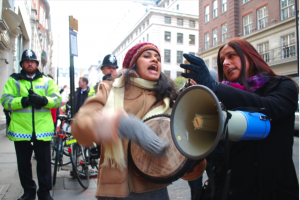 A loud group of protesters from Foil Vedanta and other grassroots groups mobbed the company’s Mayfair headquarters today holding a banner reading ‘FCA: de-list Vedanta’. The demonstration called for the Financial Conduct Authority to remove Vedanta from the London Stock Exchange for poor corporate governance and human rights crimes.
A loud group of protesters from Foil Vedanta and other grassroots groups mobbed the company’s Mayfair headquarters today holding a banner reading ‘FCA: de-list Vedanta’. The demonstration called for the Financial Conduct Authority to remove Vedanta from the London Stock Exchange for poor corporate governance and human rights crimes.
Simultaneously the Indian Supreme Court deferred its final verdict on Vedanta’s planned mega-mine until 21st January. If permission to mine is denied Vedanta is likely to close its Lanjigarh refinery due to lack of bauxite costing them billions.
Yesterday five hundred tribals and farmers from the Niyamgiri hills rallied against the company, while today in New York protesters gathered outside the UN. On Sunday the Minister of Rural Development Jairam Ramesh plans to meet the Dongria Kond on the threatened mountain1.
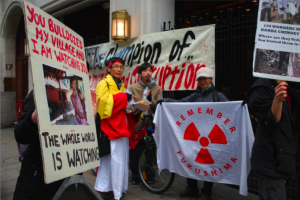 See the video here!
See the video here!
Protesters from a variety of grassroots groups (including Foil Vedanta, Phulbari Solidarity Group, South Asia Solidarity Group Japan Against Nuclear, Tamil Solidarity, National Committee of Bangladesh, Climate Justice Collective, the UK Committee to Protect Oil, Gas, Power-Port and Mineral Resources, Occupy London, World Development Movement and London Mining Network) gathered at Vedanta’s London headquarters today to add their voice to recent pressure for Vedanta to be de-listed from the London Stock Exchange for its poor corporate governance, illegal operations and major human rights violations.(1) They shouted ‘Vedanta out of London’ and blew horns and whistles. Several parliamentarians and the former CBI Director Richard LambertLondon have highlighted how Vedanta’s listing is used for legal immunity to hide their corporate crimes.(2)
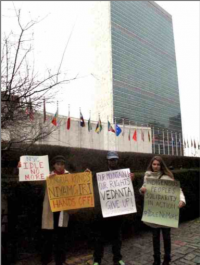
At the Supreme Court in Delhi today lawyers for Vedanta dwelled on the ongoing demonstrations in London, asking why people are protesting there, and claiming that India is suffering because of this. Judges noted that this is not relevant to the case and pointed out that people have a right to protest. Foil Vedanta’s spokesperson reacted:
“Vedanta is a London listed company and profits from this affiliation. It is typical of Vedanta to assume they are above the law and above public accountability. We will continue to draw attention to their corporate crimes here in London”.
Meanwhile in New York activists rallied outside the United Nations Headquarterspointing out Vedanta’s violations of the UN Declaration on the Rights of Indigenous Peoples(4).
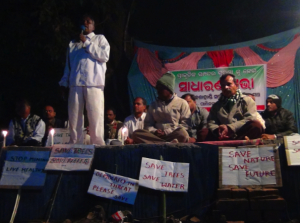 In Bhawanipatna in Odisha, India, five hundred of tribals and farmers demonstrated defiantly yesterday in anticipation of the Supreme Court verdict on the contested Niyamgiri project(3). Activists at the rally chanted “Vedanta go back: water, land and forest ours. We are Supreme people of the supreme court” while dalit leader Surendra Nag spoke about the loss of land and livelihood for local people, some of whom have ended up as beggars. One man spoke of how his whole family had been tortured by company goons and they had lost 6 acres of land to the company without compensation.
In Bhawanipatna in Odisha, India, five hundred of tribals and farmers demonstrated defiantly yesterday in anticipation of the Supreme Court verdict on the contested Niyamgiri project(3). Activists at the rally chanted “Vedanta go back: water, land and forest ours. We are Supreme people of the supreme court” while dalit leader Surendra Nag spoke about the loss of land and livelihood for local people, some of whom have ended up as beggars. One man spoke of how his whole family had been tortured by company goons and they had lost 6 acres of land to the company without compensation.
The project has been racked with controversy from the start, as a spate of recent coverage points out: The Lanjigarh refinery built to process the bauxite from the hills was illegally constructed, the court case presided over by a judge with shares in the company, and the refinery should never have been given permission without including the associated mega mine in impact assessments2. The Delhi High Court is also currently investigating the large donations from Vedanta to India’s two main political parties which could be deemed illegal as Vedanta is a foreign (British) company3.
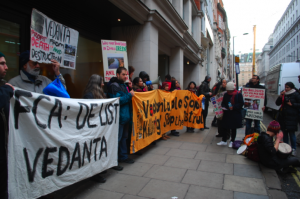 A cover story in major Indian glossy Open Magazine in December details evidence of corruption and collusion between Vedanta and the Odisha state government, local officials, judges and the police to force the project through4. Meanwhile Vedanta’s chairman and 56.7% owner Anil Agarwal has launched a rare PR crusade claiming that Vedanta ‘have not cut one tree’ and respects and preserves the rights of the protesting indigenous tribe living on the threatened mountain. He sets out his extractive philosophy for India – suggesting that exploration should be drastically increased and regulation decreased to provide for the domestic market for metals and oil. 56
A cover story in major Indian glossy Open Magazine in December details evidence of corruption and collusion between Vedanta and the Odisha state government, local officials, judges and the police to force the project through4. Meanwhile Vedanta’s chairman and 56.7% owner Anil Agarwal has launched a rare PR crusade claiming that Vedanta ‘have not cut one tree’ and respects and preserves the rights of the protesting indigenous tribe living on the threatened mountain. He sets out his extractive philosophy for India – suggesting that exploration should be drastically increased and regulation decreased to provide for the domestic market for metals and oil. 56
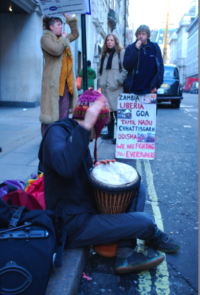 If Vedanta loses the case to allow state owned company Orissa Mining Corporation to mine the mountain on their behalf they may have to close the dependent Lanjigarh refinery costing them billions. Under enormous pressure from Vedanta the Odisha government has suggested alternative bauxite supplies from a deposit located in a major wildlife sanctuary and tribal area at Karlapat arousing anger and opposition from grassroots groups.(5)
If Vedanta loses the case to allow state owned company Orissa Mining Corporation to mine the mountain on their behalf they may have to close the dependent Lanjigarh refinery costing them billions. Under enormous pressure from Vedanta the Odisha government has suggested alternative bauxite supplies from a deposit located in a major wildlife sanctuary and tribal area at Karlapat arousing anger and opposition from grassroots groups.(5)
The court’s decision rests on whether the Green Bench of India’s Supreme Court rules the rights of forest dwellers to be ‘inalienable or compensatory’7. In view of this India’s Tribal Affairs Minister V Kishore Chandra Deo has asked the Environment Minister to ensure the rights of forest dwellers is protected in the spirit of the Forest Dwellers act.8 (6)
Speaking about the verdict Dongria Kond activist Lado Sikaka states:
“We will continue our fight even if Vedanta gets permission. Are these Judges above the Law? In effect, they act as if they are. Niyamgiri belongs to us. We are fighting because We are part of it. Our women are harassed and we are called by the police and threatened not to go to rallies. Last month they have been working like Vedanta’s servants.9”
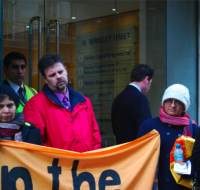 Foil Vedanta’s Samarendra Das says:
Foil Vedanta’s Samarendra Das says:
“Vedanta is not the only mining company that should be de-listed for their corporate crimes. Infamous London listed offenders Lonmin in South Africa, Monterrico in Peru, GCM in Phulbari and Bumi in Indonesia should also be investigated for extensive human rights atrocities.”
Coverage of the demo:
The Hindu ‘Protest at Vedanta Headquarters’
Demotix ‘Protest calls for mining company Vedanta to be kicked out of London’
Orissa Matters ‘Global protests against Vedanta continue as verdict deferred again’
Radical Notes ‘Global protests against Vedanta, jan 11th – A report’
Demotix ‘Mayfair protest outside Vedanta Plc’s London offices’
Indymedia ‘Vedanta protest in London today – report and pics‘
Kracktivist blog, ‘Global protests against #Vedanta’
(1) British registered mining company Vedanta have been named the ‘world’s most hated company’ by the Independent newspaper for their long list of environmental and human rights crimes for which they are being opposed all over the world10. Most famously Vedanta’s plan to mine a mountain sacred to the Dongria Kondh tribe in Odisha, India, has led to mass protests and the Church of England among others pulling out investments.
(2) Vedanta was described in Parliament by Labour MP Lisa Nandy as ‘one of the companies that have been found guilty of gross violations of human rights’ . Ms Nandy in her speech quoted Richard Lambert the former Director General of the CBI: ‘It never occurred to those of us who helped to launch the FTSE 100 index 27 years ago that one day it would be providing a cloak of respectability and lots of passive investors for companies that challenge the canons of corporate governance such as Vedanta…’.11.
Similarly City of London researchers from ‘Trusted Sources’ have noted Vedanta’s
reasons for registering in London:
‘A London listing allows access to an enormous pool of capital. If you are in the FTSE Index, tracker funds have got to own you and others will follow. Both Vedanta Resources and Essar Energy are members of the FTSE 100. London’s reputation as a market with high standards of transparency and corporate governance is another draw for Indian companies. Both Vedanta and Essar have faced criticism on corporate governance grounds in India, and a foreign listing is seen as one way to signal to investors that the company does maintain high standards.’
In a parliamentary debate on 28th Nov 2012, MP John McDonnell made the case for Vedanta and other ethically contentious mining companies to be strongly regulated by the Financial Conduct Authority, including possibly de-listed ‘because of their behaviour in the developing world.’12
(3) Niyamgiri Surakhya Samiti, Sachetana Nagarika Mancha, Loka Sangram Mancha, Communist Party of India and Samajwadi Jan Parishad will coordinate the rally in Odisha on the 10th Jan.
(4) Please contact us for a statement on Vedanta’s violations of the UN Declaration on the Rights of Indigenous People (UNDRIP) which was endorsed by the UK in 2007. In particular the Niyamgiri project affects the right to water and to free prior informed consent of the local people.
(5) Please contact us for a 6th Jan 2013 Press Release on this from Lok Shakti Abhiyan and Lohia Academy in Odisha entitled ‘Mining in Karlapat will bring disaster to Nature & Climate’.
(6) The Supreme Court is due to make a fnal decision on the challenge posed to the Environment Ministry’s stop to the Niyamgiri mine on 11th January. In its December 6th hearing the Supreme Court concluded that the case rested on whether the rights of the indigenous Dongia Kond’s – who live exclusively on that mountain – could be considered ‘inalienable or compensatory’. The previous ruling by Environment and Forests minister Jairam Ramesh in August 2010 prevented Vedanta from mining the mountain due to violations of environment and forestry acts. The challenge to this ruling has been mounted by the Orissa Mining Corporation, a state owned company with 24% shares in the joint venture to mine Niyamgiri with Vedanta, begging questions about why a state company is lobbying so hard for a British mining company in whom it has only minority shares in this small project. (see http://infochangeindia.org/environment/features/niyamgiri-a-temporary-reprieve.html)
1http://www.orissadiary.com/CurrentNews.asp?id=38757
2‘Games Vedanta Plays’. Economic and Political Weekly.December 22, 2012. http://www.epw.in/editorials/games-vedanta-plays.html
3http://newindianexpress.com/nation/article1415930.ece
4Mihir Srivastava. ‘How Big Business Gets Its Way: Companies like Vedanta are brazenly taking over governance in some parts of India’. Open Magazine. 22nd Dec 2012. http://www.openthemagazine.com/article/nation/how-big-business-gets-its-way
5Anil Agarwal. ‘Open mining policy can make India an economic powerhouse: Anil Agarwal, Chairman, Vedanta’. Economic Times of India. Dec 17th 2012. http://articles.economictimes.indiatimes.com/2012-12-17/news/35868865_1_bauxite-reserves-resources
6Anil Agarwal interviewed on ‘Walk the talk’. NDTV. January 5th 2012. http://www.ndtv.com/video/player/walk-the-talk/walk-the-talk-with-vedanta-chairman-anil-agarwal/260829
7http://infochangeindia.org/environment/features/niyamgiri-a-temporary-reprieve.html
8Urmi A Goswami, ‘Protect the rights of forest dwellers: Tribal affairs minister V Kishore Chandra Deo.’ Economic Times of India. Dec 21, 2012. http://articles.economictimes.indiatimes.com/2012-12-21/news/35953333_1_forest-dwellers-forest-rights-act-vedanta-case
9Excerpt from footage at http://www.youtube.com/watch?v=V3FZX5DrccU&feature=player_embedded
10 ‘http://www.independent.co.uk/news/business/analysis-and-features/vedanta-resources-the-worlds-most-hated-company-2037977.html
11http://www.publications.parliament.uk/pa/cm201213/cmhansrd/cm120522/debtext/120522-0002.htm
12http://www.publications.parliament.uk/pa/cm201213/cmhansrd/cm121128/halltext/121128h0002.htm